At the Aspen Institute Economic Opportunities Program, we believe that confronting the inequities that divide us along the lines of race, gender, ethnicity and geography, restoring the promise of work, and broadening opportunities to participate in business ownership are essential to building a more free, more just, and more equitable world. Below we share our monthly newsletter with highlights of recent work. As always, we welcome your feedback, thoughts, and partnership in advancing inclusive opportunity and an economy in which we all can thrive. Click here to subscribe.
Click here to view past editions of our newsletter
News and Updates

A Workers’ Bill of Rights: What We Want and How to Get There
Laws designed decades ago have increasingly proved inadequate to protecting workers’ well-being. But workers are not sitting idly by. Will today’s organizing efforts lead to a renewed and expanded commitment to working people sharing in the country’s economic success? On May 26, we hosted a discussion on A Workers’ Bill of Rights: What We Want and How to Get There, the final event in our five-part series on the History and Future of U.S. Labor Law. Featured speakers included Jaz Brisack (Starbucks Workers United), Don Howard (The James Irvine Foundation), Linda Nguyen (United Food and Commercial Workers Local 770), Ai-jen Poo (National Domestic Workers Alliance), and Dorian Warren (Community Change), with opening remarks from Aspen Institute President Dan Porterfield. We are pleased to share a recording of our conversation, including video, audio, and written transcript. Learn more.
Tweet Work has changed dramatically over the years, but workplace protections have not. Building on the legacy of last century’s reforms, organizers are forging a new, broader vision of workers’ rights.
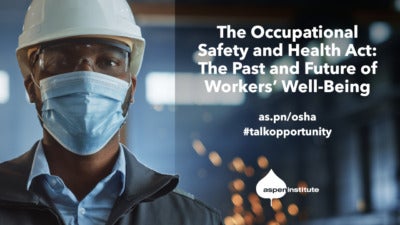
The Occupational Safety and Health Act: The Past and Future of Workers’ Well-Being
Signed in 1970, the Occupational Safety and Health Act has been a tremendous success in advancing worker protection and workplace safety. But challenges remain, and access to safe workplaces is not shared equitably. How can we build a safer workplace for all workers? On May 4, we hosted a virtual discussion on The Occupational Safety and Health Act: The Past and Future of Workers’ Well-Being, the fourth event in our five-part series on the History and Future of U.S. Labor Law. Featured speakers included Magaly Licolli (Venceremos), Dr. David Michaels (The George Washington University School of Public Health), Saket Soni (Resilience Force), Jon Woodsum (Barton Malow Company), and moderator Andrea Hsu (NPR). We are pleased to share a recording of our conversation, including video, audio, and written transcript. Learn more.
Tweet Workplace fatalities dropped by 65% since 1970. But over 5,000 workers still die annually on the job and millions are injured. How can we build safer workplaces? Hear @AspenJobQuality and guests #talkopportunity.
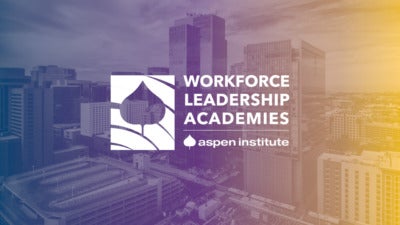
EOP Seeks Partners to Offer Local Workforce Leadership Academies
After partnering with local organizations in 11 cities to deliver 14 Workforce Leadership Academies, we are excited to extend a new opportunity: for the first time, EOP is issuing a Request for Applications for partners for an additional six Academies. Academies bring together leaders from across local workforce ecosystems into a 10-month Fellowship to deepen networks, strengthen systems leadership skills, apply a race, equity, and systems change framework to leaders’ work, and deepen understanding of effective strategies and programs. They provide a forum for local leaders to work collaboratively to identify local and regional systems-based challenges and create shared solutions.
- Learn more about this opportunity
- View the Request for Applications
- Complete Letter of Intent to Apply survey (due June 24)
- RSVP for our informational webinar (June 8)
Tweet Applications are now open for @AspenJobQuality’s #Workforce Leadership Academies, which is seeking partners in six new cities. Academies provide a forum for #wkdev leaders to collaborate on local challenges and create shared solutions.
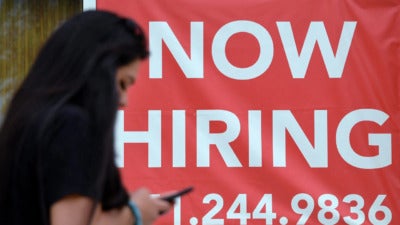
Photo credit: Frederic J. Brown—AFP/Getty Images
Centering Job Quality in our Public Dialogue
Why are so many people leaving their jobs and so many openings going unfilled? “The better question is: Why does no one want this job or to work in this sector?” asks Executive Director Maureen in an op-ed for Fortune. While many attribute our current “labor shortages” to workers themselves, we should instead look at the jobs and industries they’re reluctant to enter. “Employers having the most trouble filling open positions are overwhelmingly offering poor-quality jobs,” including those “dominated by low wages, few benefits, and little employment security or stability.” Rather than simply laying the blame on workers, businesses and governments should play a proactive role in expanding the availability of high-quality jobs. Let’s “stop trying to fix people and start fixing work.” Read more.
Tweet .@AspenJobQuality’s @conway_maureen asks us to consider what workers really need in this @FortuneMagazine op-ed. Instead of blaming workers for a “Great Resignation,” let’s look at the quality of the jobs they’re leaving.
Conway also helped kick off the second season of the “All In: Student Pathways Forward” podcast, discussing job quality with host Marc Goldberg. Conway offers an expansive definition of job quality that is informed by the experiences of workers themselves, pointing to the many insightful resources collected in our Job Quality Tools Library. She discusses the connection between job quality and basic needs insecurity for students, and describes how community colleges and workforce development agencies can advance job quality with employer partners. Listen to the conversation.
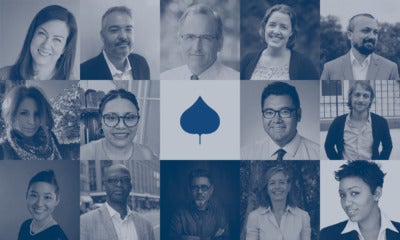
Fellows Focus on Job Quality and Equity
This month, the new 2022-23 class of Job Quality Fellows met for the first time at the Aspen Institute in Washington DC. Fellows engaged with an insightful slate of guests. Aspen Institute President Dan Porterfield shared the Institute’s history and mission and outlined the urgent need to build job quality and empower workers. Harvard labor law expert Sharon Block engaged Fellows in a conversation about labor laws and provisions on working conditions, safety, and pay for workers and ideas for reform. Deputy Secretary of Labor Julie Su joined Fellows for a private reception, highlighting the Administration’s actions and plans on job quality, diversity, equity, inclusion, and access to good jobs. Finally, Angela Hanks (Formerly, Employment and Training Administration) and Mary Alice McCarthy (New America) discussed prospects and options for reforming the Workforce Innovation and Opportunity Act to engage the job training system in addressing job quality and equity. Fellows also discussed emergent issues in their work, and focused on key strategies to better connect workforce development and worker rights organizing: building a public narrative that values frontline workers and centers the need to improve job quality and equity; developing capacity in workforce development organizations to better engage worker voices and build worker knowledge of their rights and protections; enhancing capacity in unions and worker centers to reach workers and expand worker organizing; and generating resources to support these efforts.
Tweet From strikes to union drives to the #GreatResignation, working people are demanding better. They deserve improved #jobquality. The new @AspenJobQuality Fellows are committed to making it happen—through workforce development, organizing, and advocacy.
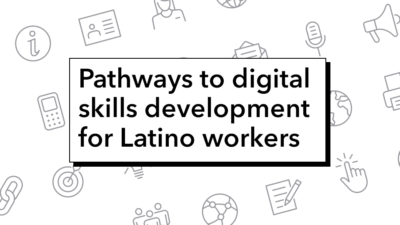
Pathways to Digital Skills Development for Latino Workers
UpSkill America and the Aspen Institute Latinos and Society Program, with support from Google.org, launched the Digital Skills and the Latino Workforce research project to better understand the challenges and opportunities that Latino workers and Latino business owners face to succeed in the digital economy. A new report, “Pathways to digital skills development for Latino workers,” presents findings from a nationwide survey and in-depth interviews with employers of Latino frontline workers and workforce development organizations. The publication also identifies promising business practices and ecosystem approaches to developing the digital skills of the Latino workforce. Finally, the report concludes with a call-to-action for employers and workforce organizations to get involved in the planning process around the Digital Equity Act programs, to start in Summer 2022. Read more.
Tweet The pandemic accelerated technological change — reshaping industries and disrupting labor markets. This report by @AspenLatinos and @upskillamerica examines the challenges and opportunities Latino workers and business owners face in the digital economy.
Latinos and Society Program Executive Director Domenika Lynch cited this report in a discussion on “Closing the Hispanic Digital Skills Gap” at SXSW EDU. You can listen to the full conversation on the WorkingNation’s Work in Progress podcast.
In other upskilling news, Children’s Hospital Colorado announced a partnership with Guild Education to provide tuition-free education benefits to employees. And Starbucks celebrated its largest-ever class of graduates through the Starbucks College Achievement Plan, a partnership with Arizona State University to provide tuition-free bachelor’s degrees to participating employees.

Bankers Roundtable: Diversifying Your Small Business Lending
On May 3, Business Ownership Initiative Senior Director Joyce Klein spoke at a Bankers Roundtable: Diversifying Your Small Business Lending, hosted by the Federal Reserve Banks of Kansas City and Dallas, the Federal Deposit Insurance Corporation, and the Office of the Comptroller of the Currency. The event covered findings from the Small Business Credit Survey and explored approaches that CDFIs are using to expand their lending to business owners of color. Click here to watch.
Tweet Video: “Bankers Roundtable: Diversifying Your Small Business Lending.” Featuring @Aspen_BOI, @GoWESST, @COEnterpriseFnd, and @usbank. Hosted by @KansasCityFed, @DallasFed, @FDICgov, and @USOCC.
Upcoming Events

June 2: The Changing Nature of Work and Implications for Families, Programs, and Research (Virtual)
On June 2, Future of Work Initiative Director Shelly Steward will speak at the virtual 2022 Research and Evaluation Conference on Self-Sufficiency, hosted by the U.S. Department of Health and Human Services. Her plenary session, “The Changing Nature of Work and Implications for Families, Programs, and Research,” will explore emerging and ongoing trends in the labor market and implications for the nature of work over the coming decade. Key themes include worker displacement due to technology or automation, the rise of alternative and “gig” work arrangements, and increasing demand for care work. Steward will speak alongside Cynthia Miller (MDRC), Kristen Broady (Federal Reserve Bank of Chicago), Alex Camardelle (Joint Center for Political and Economic Studies), and Paul Osterman (Massachusetts Institute of Technology). This session will run from 2:15-3:30 p.m. EDT. Click here to register.
Tweet June 2: The Changing Nature of Work and Implications for Families, Programs, and Research. With @shellysteward @AspenFutureWork, Cynthia Miller @MDRC_News, @KEBroady @ChicagoFed, @AKCamardelle @JointCenter, and @ostermanpaul @MITSloan. @OPRE_ACF #RECS2022/
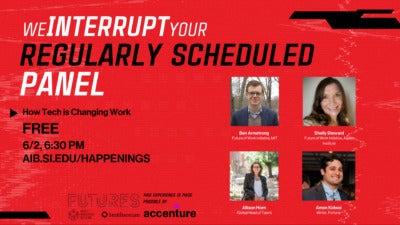
June 2: How Tech is Changing Work (Virtual and In Person)
Later on June 2, Steward will speak at the Smithsonian Arts + Industries Building in Washington DC on a panel about How Tech is Changing Work. What new technologies and trends are currently moving the needle on how and where we work? How can we continue to use workplace technologies to benefit the employee’s overall wellbeing? This session will explore how rising technologies and ideas–such as remote/teleworking, the four-day work week, virtual reality, and artificial intelligence–will transform the future of our workplaces. Steward will speak alongside Ben Armstrong (MIT), Allison Horn (Accenture), and Aman Kidwai (Fortune). This session will run from 6:30-7:30 p.m. EDT, and guests can participate either virtually or in person. Click here to register.
Tweet Join @SmithsonianAIB for a conversation on “How Tech is Changing Work,” June 2 at 6:30p ET, online or in person (DC). Featuring @shellysteward @AspenFutureWork, Ben Armstrong @MIT, @allisonhorn @Accenture, and Aman Kidwai @FortuneMagazine. #TheFUTURES
Join the conversation
Follow EOP on social media to join the conversation!
-Job quality updates from EOP @AspenJobQuality
-Business Ownership Initiative @Aspen_BOI
-UpSkill America @upskillamerica
-Future of Work Initiative @AspenFutureWork
About EOP
The Aspen Institute Economic Opportunities Program (EOP) advances strategies, policies, and ideas to help low- and moderate-income people thrive in a changing economy. We recognize that race, gender, and place intersect with and intensify the challenge of economic inequality and we address these dynamics by advancing an inclusive vision of economic justice. For over 25 years, EOP has focused on expanding individuals’ opportunities to connect to quality work, start businesses, and build economic stability that provides the freedom to pursue opportunity. For more information, visit as.pn/eop.
EOP has several initiatives, including the Business Ownership Initiative, Workforce Strategies Initiative, UpSkill America, Good Companies/Good Jobs, and the Future of Work Initiative. In addition, across these approaches EOP hosts the Economic Opportunity Fellows Network and the Opportunity in America event series.
Thank you to our many partners and funders for supporting our efforts.
Support Our Work
We are committed to making our events and publications freely available to everyone who finds them useful. But if you find value in our work and are able to support it, please consider making a tax-deductible donation. Click here to learn more.
Keep in Touch
Click here to join our mailing list. For updates every day, follow us on social media.

